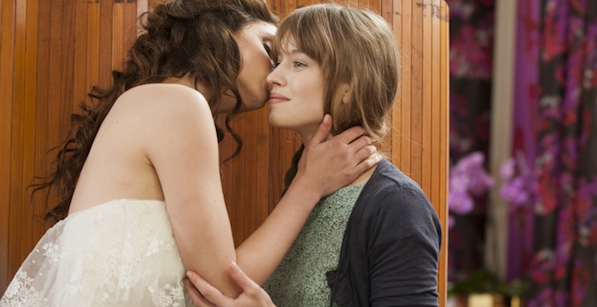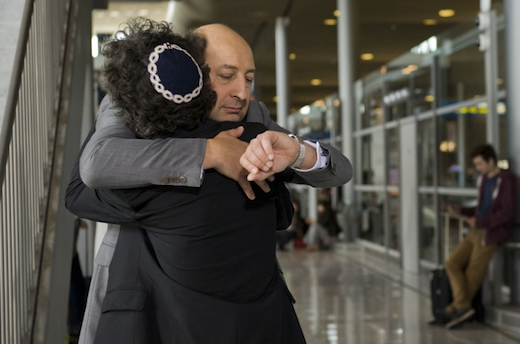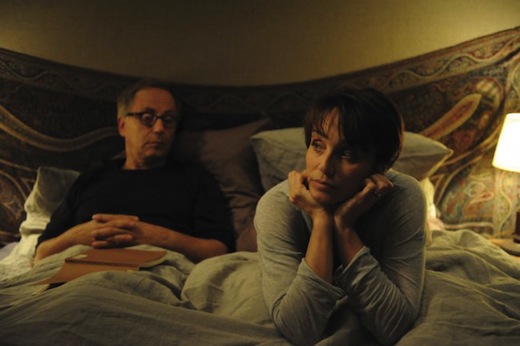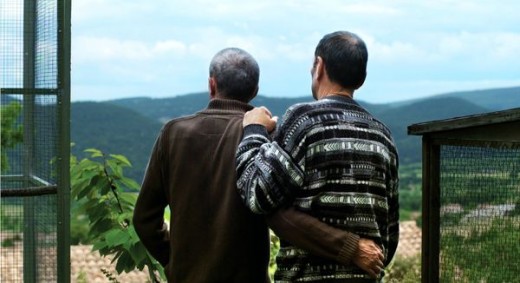This week, as it has for the past seventeen years, Los Angeles is being treated to the City of Lights, City of Angels film festival, a well-crafted showcasing of the latest noteworthy works from France running through to April 22 at the Directors Guild of America theater. As always the festival proffers the question “Whither the French cinema?” And as always no easy answer can be expected to be found. Often “Col/Coa,” as it’s referred to, features works of considerably cinematic consequence, like this year’s Alain Resnais masterpiece You Ain’t Seen Nothin’ Yet. But such swallows do not make a summer. Col/Coa does however this time out provide a generous helping of compare/contrast with the past by featuring modern classics A nos amours (Maurice Pialat’s bittersweet coming-of-age tale that introduced Sandrine Bonnaire in 1983), Louis Malle’s almost-in-real-time slow motion suicide study Le Feu Follet (a.k.a. The Fire Within, 1963), Alain Resnais powerhouse Jean-Paul Belmondo vehicle Stavisky (1974), in which the great star (in arguably his greatest role) embodies the legendary swindler with the help of Charles Boyer and an amazing sore by Stephen Sondheim, Jacques Demy’s deluxe Jeanne Moreau-embodied (1963) gambling romance, Bay of the Angels (I myself will be on hand to chair a post-screening discussion on April 19th), and André Téchiné’s The Bronte Sisters (1979) in which the famous trio are played by another famous trio—Isabelle Adjani, Marie-France Pisier and Isabelle Huppert—with a guest star turn by Roland Barthes as William Makepeace Thackeray. Obviously a new and old Resnais supply a point of particular contrast, especially as the new one (an adaption of two Jean Anouilh plays about actors and acting that’s Resnais most structurally ambitious work since his 1980 Mon Oncle d’Amerique ) is quite unlike anything out there regardless of country of origin, But as for the other Col/Coa offerings, one might say that the French cinema at the moment is, with a few exceptions sticking to the tried and true.
Nothing indicates this more than the opening night offering It Happened in Saint-Tropez, a highly polished comedy-drama from the highly polished Daniele Thompson. While the French title of this film in which a family wedding is unexpectedly interposed with a family funeral is Des Gens qui s’embrassent (ie. People Kissing) the U.S. title evoking the sun-drenched resort town is quite a propos as in this Thompson film, like the writer-director’s previous offerings La Buche (1999), Jet Lag (2002) and Avenue Montaigne (2006) centers on well-heeled middle-class people with problems that can be easily resolved within a standard feature time frame. The wedding recalls the Thompson-scripted blockbuster Cousin Cousine (1975) while the funeral nudges ever-so-gently alongside the far more tumultuous one in the Thompson-co-scripted Those Who Love Me Can Take the Train (1998), directed by Patrice Chereau. While she worked with this dark maestro previously on his Queen Margot (1994), Thompson’s true cinematic calling falls on the side of her father Gérard Oury whose comic blockbuster The Adventures of Rabbi Jacob (1973) she also co-wrote. In It Happened in Saint-Tropez tender feelings are stirred but just so, and no more as is proper for a film of this kind.
For the “improper” one could find no better example that François Ozon’s In the House (Dans la Maison), a deliciously dark comedy of manners in which an otherwise bored middle-school teacher (Fabrice Luchini) finds himself drawn to the writing assignments of a precocious pupil (Ernst Emhauer) who has taken a far-from-healthy interest in the life of a classmate’s family. Is he fashioning this seeming literary voyeurism out of his own feverish imagination, or is it real? More to the point why is our treaching egging this borderline-dangerous pupil on? If you’ve seen such works as Under the Sand (2000), Swimming Pool (2003) and Le Refuge (2009) then you’ll know this gay auteur is “up to know good” full bore. And in Fabrice Luchini he’s found a perfect means of expressing his teasingly dark ideas. Hard to believe that this actor who began his career as a typical teenager in Eric Rohmer’s Claire’s Knee (1971) would blossom into the most suavely skilled acting stylist since Louis Jouvet.
As for the rest of the festival Les Invisibles, a documentary about aging gays and lesbians is a rare, and welcome, non-fiction offering from another noted gay filmmaker, Sebastien Lifschtz (whose 2000 Come Undone remains a modern classic) and Philippe Godeau’s 11.6 is a welcomingly original contribution to the crime-caper genre. Looking more like Dustin Hoffman’s French cousin than ever Francois Cluzet (so wonderful in Bertrand Tavernier‘s 1986 jazz tribute film Round Midnight) plays real-life criminal legend Toni Musulin who in 2009 pulled off the “crime of the century” by taking 11.6 million euros form the security truck he had for years worked as a driver for. What makes this “inside job” story so fascinating is the anti-hero’s absolute inscrutability. We keep searching his face for whys, if not wherefores, as he executes his plans with the gravity of a master criminal in a Jean-Pierre Melville film. But Godeau plays his cards far close to his chest than Melville, leading to a finale that suggests Musulin—who has so far served five years of his sentence in solitary confinement—may have outsmarted everyone after all. Time will tell if Godeau will merit a place alongside Melville—not to mention the other giants “Col/Coa” is celebrating this year: Demy, Piala, Malle and Resnais. But he’s off to a very good start.







